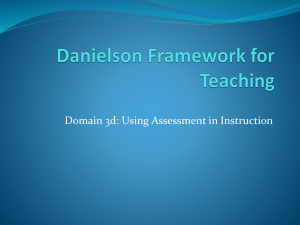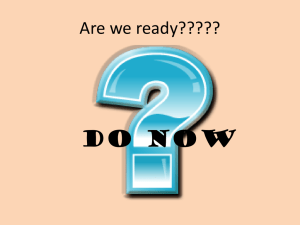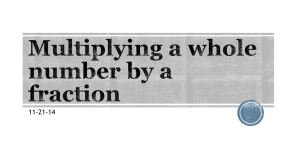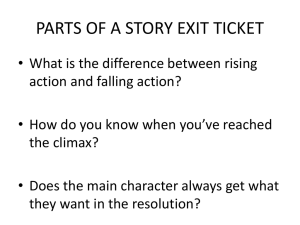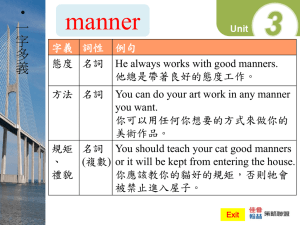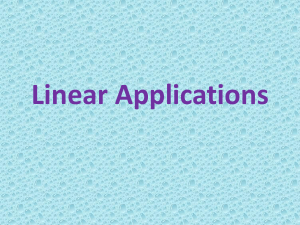Tiered Exit Tickets
advertisement
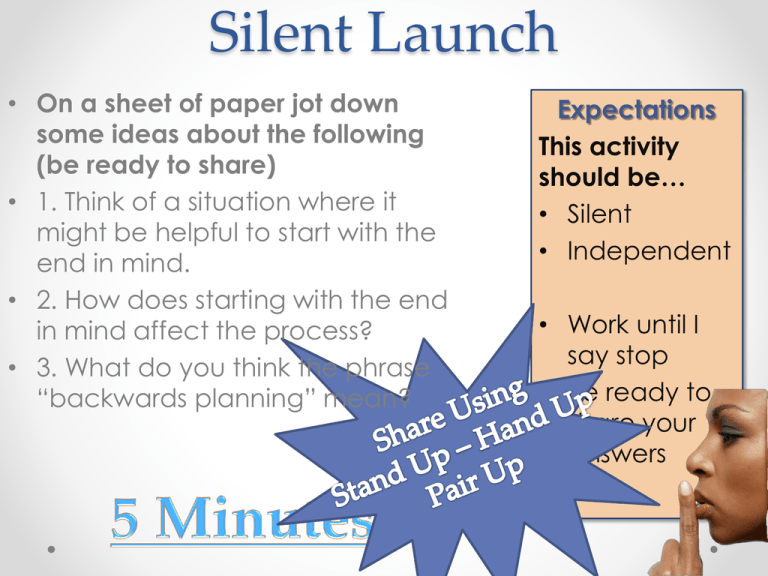
Silent Launch • On a sheet of paper jot down some ideas about the following (be ready to share) • 1. Think of a situation where it might be helpful to start with the end in mind. • 2. How does starting with the end in mind affect the process? • 3. What do you think the phrase “backwards planning” mean? Expectations This activity should be… • Silent • Independent • Work until I say stop • Be ready to share your answers Tiered Exit Tickets Content/Language Objective • Today I will… • Practice creating tiered exit tickets for a Navigator module by completing a Navigator lesson in groups. What is a “tiered exit ticket?” • An exit ticket is a way of assessing a student’s understanding on a daily basis • We will record these scores in a google doc • Here are the tiers o o o o o 0 – No work done or work is not connected to prompt 1 – (Unsatisfactory) Work is incorrect and shows little understanding 2 – (Partially Proficient) Student shows low level understanding 3 – (Proficient) Student is able to reproduce work done in class 4 – (Advanced) Student is able to take the concept beyond the work in class An Example • This ticket is directly connected to the content objective of the day • Objective: SWBAT explain the steps verbally to each other for adding fractions with unlike denominators. • Exit Ticket: 3 2 o 1. What is a denominator? + =? 4 3 o 2. What is the common denominator between these two fractions? o 3. Find the sum of the two fractions. o 4. What are two other fractions that have the same sum? Rationale for DPS Content/Language Objective: In planning for all students to be able to access ambitious new core content, we recognized that teachers needed a structure to be deliberate about student access to content. Components of DPS Content/Language Objective • Content What are students learning? • Targeted Domain What domain will I specifically target in this lesson? • Language Function How will students use language in the lesson? • Language Form What grammatical structures of the language and what academic vocabulary will be used? • Differentiated Supports What supports will my levels 1-2 students need to understand the content? What supports will my levels 3-4 students need to understand the content? What supports will my on-grade-level students need to understand the content? DPS Content/Language Objective Structure A language function articulated to a language domain, a language form, content, and language supports that are differentiated according to language proficiency levels to support flexible groups: a) levels 1 and 2; b) levels 3 and 4; and c) levels 5 and 6 Tools for Writing Content/Language Objectives Functions by Language Domain Listening Speaking Reading act, arrange, distinguish, duplicate, categorize, choose, copy, follow directions, identify, indicate, label, listen, match, order, point, recognize, role play, show, sort, tell agree/disagree, answer, ask, converse, debate, define, describe, discuss, explain, express, give instructions, identify, name, practice, predict, pronounce, rehearse, repeat, rephrase, respond, restate, say steps in a process, share, state, summarize, tell, use vocabulary discover, distinguish, explore, find, find specific information, identify, infer, interpret, locate, make connections, preview, predict, read, read aloud, skim Writing ask and answer questions, brainstorm, classify, collect, compare, contrast, create, describe, edit, evaluate, explain, illustrate, journal, label, list, order, organize, record, revise, state and justify, opine, summarize, support, take notes, write 5 High Yield Functions 1)Describe, Explain, Classify 2)Compare and Contrast 3)Sequence 4)Cause & Effect 5)Defend/Propose/Justify Sample Language Forms Language Function Expressing needs and likes Describing people, places, and things Possible Language FORMS Indirect/ direct object, subject/ verb agreement, pronouns I like/don’t like—(object)—. I need a/some—(object)—. Nouns, pronouns, adjectives The (my, her) ____is/are____. A (it) has/have ____. Prepositional phrases Describing spatial and temporal relations next to, beside, between, in front of, in back of, behind, on the left/right, in the middle of, above, below, under Adverbs Describing actions telling how, where or when Past tense verbs, past progressive Retelling/relating past events Yesterday/Last___/On___day, (pronoun)___-ed. (pronoun) ___was/were (have/has been) ____-ing. Sample #1 Students will orally explain, using sequential words (first, second, …), how to solve a system of linear equations by graphing with their partners: a) using labeled cards b) using poster and graph c) using multiple systems Creating Tiered Exit Tickets • Turn & Talk: What reasons are there for creating tiered exit tickets? • Activity #1 – With a partner, find a Navigator lesson to create a tiered exit ticket for: o 1. Take 10 minutes to SILENTLY work through the problem o 2. Now… 10 minutes to discuss the math with your partner o 3. Create a student-friendly content/language objective for this lesson. o 4. Take 15 minutes to: • A) Create a 4-tiered exit ticket • B) Write down the objective and exit ticket on chart paper • C) Be prepared to SHARE OUT! Share Out • After each group shares out… use these sentence starters/stems to give constructive feedback • “One thing I think you did really well was…” • “One thing I thought could use some more refining was…” • “I really learned _______________ from your idea of using _______________________.” • “I was unclear about…” Wrap-Up • Today we… • Practiced creating tiered exit tickets for a Navigator module by completing a Navigator lesson in groups. Exit Task • From Fist-to-Five what is your understanding of tiered exit tickets? • From Fist-to-Five how comfortable are you right now with creating tiered exit tickets?
